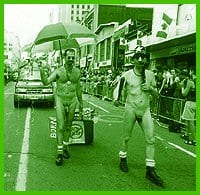Two – count ’em two – complaints from the estimated 800,000 people who attended last year’s Pride parade have prompted police to threaten a crackdown on nudity this year.
And one of the complaints was even formally dismissed by the Toronto Police Services Board and Toronto Police Chief Julian Fantino.
“Police are caught in the middle because we’re seen as neglecting our duties if we don’t arrest people,” says Supt Aidan Maher, head of 52 Division. “Last year we had complaints and didn’t lay charges. This year we’re reconsidering.”
Maher, who says he can’t recall any other complaints about Pride in his four years in the downtown police division, met this month with Pride organizers and the nudist group Total Naked Toronto Men Enjoying Nudity to ask them to prevent nudity in the parade.
Pride didn’t agree to anything, says Pride co-chair Kyle Knoeck.
“Pride’s been very clear that the priority of volunteers is to insure the safety of participants,” says Knoeck. “We at Pride don’t see our responsibility to enforce the law…. We don’t have a policy either encouraging or discouraging nudity. We don’t condone illegal activity.”
Pride volunteers will be at the parade start point, warning people about the police’s renewed concern with nudity, which can carry penalties as high as six months in jail and a $2,000 fine.
For police, public nudity is a more complicated arrest than others. In Ontario, the permission of the attorney general is needed to proceed with charges, reducing their incentive to arrest unless there are assurances the charges will be accepted. Attorney General David Young’s office won’t say if arrests have the green light this year.
“We don’t comment on our legal advice to the police,” says Brendan Crawley, the minister’s media rep. “We don’t even confirm that we have given advice to the police.”
Of the two complaints about last year’s nudity, one was from the rightwing group REAL Women. It was dismissed in March, with Fantino telling the Toronto Police Services Board officers had other priorities.
Maher says Pride is one of the city’s quietest large events, but that Criminal Code offences are Criminal Code offences. Police have to act on all offences if there are complaints – even if there are 799,998 people who are neutral or positive toward the nudity.
“I represent the public. As a police officer you have to look at our position,” says Maher. “If you don’t like [the law], you can go to your local MP and ask that they remove it from the Criminal Code.”
Lawyer Peter Simm, a member of TNT MEN, says the law isn’t so clear cut. He’s presented Maher with piles of case law suggesting that exposed genitals in a Pride parade would not be a criminal act. He says that if police think they can arrest people, they haven’t done their homework.
“If there are any legal authorities [Maher] has, I’d be delighted to hear from him,” says Simm. “The public nudity provision in the Criminal Code appears to be constitutionally void and unenforceable.”
Simm says , according to the legislation, wearing footwear makes a difference; Maher calls that a “bad argument.”


 Why you can trust Xtra
Why you can trust Xtra


